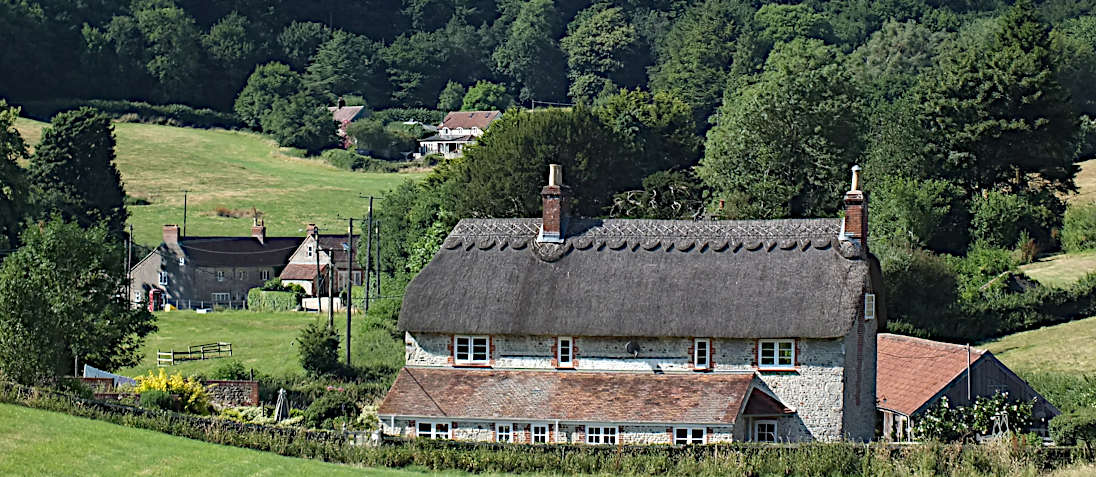
A future in the country?
More and more people want to live the rural life... but...
Linguapress intermediate
British
life : An easy intermediate
level English resource. Level B1.
WITH
AUDIO ►:
Click
to open/close audio player
Lots
of people in Britain want to live in the country; but young people
often prefer living in the city
City life is cool; but is country life cooler?
Apparently yes.
After the terrible Covid-19 epidemic of 2020, lots of people would like to leave their city and live in the country.
More and more people in Britain want to live in the country, and this is causing more and more problems in some rural areas.
The population of British cities has been falling for years. Cities like Liverpool and Glasgow have lost about 30% of their population in 30 years. But Britain's population is still growing. Where are the people going?
Answer: to the country.
The English countryside has a classic image. People imagine that life in the country is slow and calm; that there are no traffic jams, no pollution, and no crime. In some places, this is true; but in others it is not.
Small towns and villages are becoming more and more popular; people have more space and most houses have gardens. But problems are growing. Lots of people want to live in the country and work in the city; so more and more people travel long distances each day, to go to work. Of course they don't use buses (they are too slow) or trains (they don't stop in the country); they use cars. And although they live in the country, they want to use supermarkets and good fast roads.... but they do not want to see them or hear them. Besides, lots of young people say that life in the country is boring: there is not enough to do, there are not enough activities and excitements.
Little villages now have traffic problems in the morning, just like big cities! And they are getting worse.
The problems are very complicated! If everyone moves into the country, large parts of the countryside will disappear! People leave cities and big towns, to escape from urban problems; but more and more, they are bringing their problems with them.
On warm summer days, and cold winter days, air pollution can be a big problem in large parts of the south of England, not just in London. Traffic jams are now often part of life, even in the country; crime has become a serious problem in rural areas.
Perhaps there is hope for the future. Soon Britain's population will stop rising. From about the year 2030, it will perhaps start to fall. In 100 year's time, there will be less people in Britain than today - perhaps two million less. No doubt there will be less pollution too; oil and petrol will probably be rare by then.

rural: in the country - area : zone - countryside: the country, rural land - traffic jam: when traffic moves very slowly, or has to stop - travel: go, voyage - worse: more serious (comparative form of bad) - rise: go up, increase -
Return to Linguapress site index
Printing: Optimized for printing
Copyright © Linguapress. Do not copy this document to any other website
Copying permitted for personal study, or by teachers for use with their students.
Student worksheet
A FUTURE IN THE COUNTRY?
Read the
article, then decide whether these statements are right or wrong.
- There were more people in Britain in 1980 than today. R/W
- There are good fast bus services in rural parts of England. R/W
- Air pollution and traffic are problems in parts of the country. R/W
- Young people particularly like living in the country. R/W
- There is very little crime in rural areas of England. R/W
- The British population will start to get smaller before the year 2030. R/W
Grammar: verb tenses
Interactive gap-fill exercise. Use on screen or on paper
:
Put
the missing verbs back into this extract,
using the right forms and tenses. To save your answers, take a screenshot when you have completed the exercise. To revise tense use, check out the grammar pages for verbs.
More
and more people in Britain (want)
to live in the
country, and this (cause) more and
more
problems.
The population of British cities (fall) for years. Cities like Liverpool and Glasgow (lose) about 30% of their population in 30 years. But Britain's population (still grow) Where (people + go) ?
Answer: to the country.
Small towns (become) more and more popular; but problems (grow) .Lots of people (want) to live in the country and work in the city; so more and more people (travel) long distances each day, to go to work. Of course they (not use) buses (they are too slow) or trains (they (not stop) in the country); they (use) cars. And although they (live) in the country, they (want) to use supermarkets and good fast roads.
The population of British cities (fall) for years. Cities like Liverpool and Glasgow (lose) about 30% of their population in 30 years. But Britain's population (still grow) Where (people + go) ?
Answer: to the country.
Small towns (become) more and more popular; but problems (grow) .Lots of people (want) to live in the country and work in the city; so more and more people (travel) long distances each day, to go to work. Of course they (not use) buses (they are too slow) or trains (they (not stop) in the country); they (use) cars. And although they (live) in the country, they (want) to use supermarkets and good fast roads.
This teaching resource is © copyright Linguapress 2001-2024.
Revised 2021 . Originally published in Horizon, the low-intermediate level English newsmagazine.
Republication on other websites or in print is not authorised
| Linguapress; home | Découvrez l'Angleterre (en français) | Discover Britain |



